Related Research Articles

Franklin James Schaffner was an American film, television, and stage director. He won the Academy Award for Best Director for Patton (1970), and is known for the films Planet of the Apes (1968), Nicholas and Alexandra (1971), Papillon (1973), and The Boys from Brazil (1978). He served as president of the Directors Guild of America between 1987 and 1989.

Frederick George Peter Ingle Finch was an English-Australian actor of theatre, film and radio.
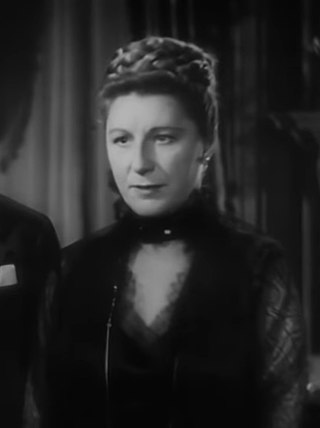
Dame Frances Margaret Anderson,, known professionally as Judith Anderson, was an Australian actress who had a successful career in stage, film and television. A pre-eminent stage actress in her era, she won two Emmy Awards and a Tony Award and was also nominated for a Grammy Award and an Academy Award. She is considered one of the 20th century's greatest classical stage actors.
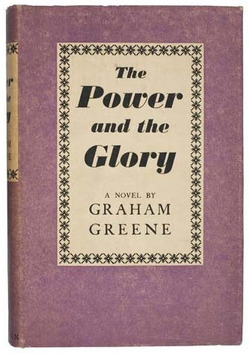
The Power and the Glory is a 1940 novel by British author Graham Greene. The title is an allusion to the doxology often recited at the end of the Lord's Prayer: "For thine is the kingdom, the power, and the glory, forever and ever, amen." It was initially published in the United States under the title The Labyrinthine Ways.
Edward Small was an American film producer from the late 1920s through 1970, who was enormously prolific over a 50-year career. He is best known for the movies The Count of Monte Cristo (1934), The Man in the Iron Mask (1939), The Corsican Brothers (1941), Brewster's Millions (1945), Raw Deal (1948), Black Magic (1949), Witness for the Prosecution (1957) and Solomon and Sheba (1959).

The Choirboys is a 1977 American comedy-drama film directed by Robert Aldrich, written by Christopher Knopf and Joseph Wambaugh based on Wambaugh's 1975 novel of the same name. It features an ensemble cast including Charles Durning, Louis Gossett Jr., Randy Quaid, and James Woods. The film was released to theaters by Universal Pictures on December 23, 1977.

Destry is a Western television series starring John Gavin that originally aired on ABC from February 14 until May 8, 1964. Destry was based on the classic James Stewart Western, Destry Rides Again, and a subsequent remake, Destry, starring Audie Murphy. This series was a midseason replacement for 77 Sunset Strip.
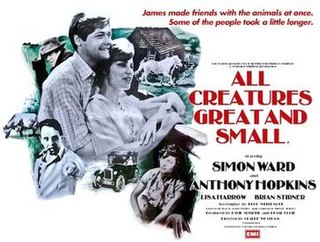
All Creatures Great and Small is a 1975 British film, directed by Claude Whatham and starring Simon Ward and Anthony Hopkins as Yorkshire vets James Herriot and Siegfried Farnon. It is based on the first novels by James Herriot : If Only They Could Talk (1970) and It Shouldn't Happen to a Vet (1972).
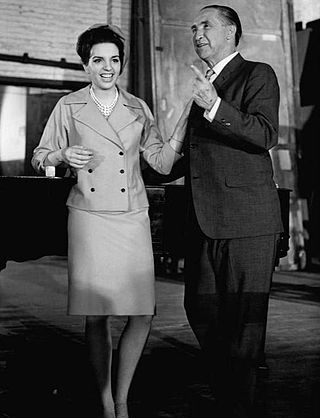
Mr. Broadway is an American 13-episode CBS adventure and drama television series starring Craig Stevens as New York City public relations specialist Mike Bell. It ran from September 20, 1964 until December 26, 1964.

Lydia Bailey is a 1952 American historical adventure film directed by Jean Negulesco and starring Dale Robertson, Anne Francis and Charles Korvin. It was made by 20th Century Fox and based on the 1947 novel of the same name by Kenneth Roberts.
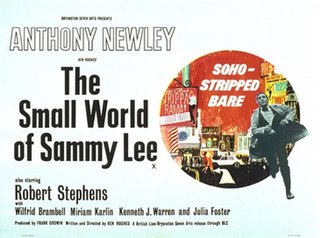
The Small World of Sammy Lee is a 1963 British black-and-white comedy-drama crime film written and directed by Ken Hughes and starring Anthony Newley, Julia Foster and Robert Stephens. The film was based on the 1958 BBC TV one-character television play Sammy, also directed by Hughes and starring Newley, described by Variety as "a masterful piece of work."
Renée Valente Smidt was an American film and television producer, as well as casting executive. Valente produced more than 70 films and television movies, including A Storm in Summer, which earned her a Daytime Emmy Award in 2001. She also received an Emmy nomination 1979 as the producer of the Blind Ambition, a television miniseries which starred Martin Sheen and Rip Torn.
The Scarface Mob is an American film noir crime film directed by Phil Karlson and starring Robert Stack. It consists of the pilot episodes for the TV series The Untouchables (1959) that originally screened as a two-part installment of Westinghouse Desilu Playhouse on April 20 and 27 1959. The episodes were cut together and released theatrically as a stand-alone feature outside America in 1959 and inside the US in 1962.
The Spiral Staircase is a 1961 American television film. It is a television adaptation of Ethel Lina White's novel Some Must Watch which was filmed in 1946 as The Spiral Staircase. It was directed by Boris Sagal.
Medea is a 1959 American TV play. It is based on the adaptation of the play by Euripides. Judith Anderson plays the title role, which she had performed on stage since 1948.
Time Remembered is a 1961 American television film for the Hallmark Hall of Fame. It was based on the play by Jean Anouilh and directed by George Schaefer.
Without Incident is a 1957 episode of Playhouse 90 starring Errol Flynn.

Victoria Regina is an American historical drama television film that aired on NBC on November 30, 1961, as part of the anthology series Hallmark Hall of Fame. The production, covering 60 years in the life of Queen Victoria, was nominated for seven Primetime Emmy Awards, winning Program of the Year, Outstanding Single Performance by an Actress in a Leading Role, and Outstanding Performance in a Supporting Role by an Actress.

The Moon and Sixpence was an American television movie broadcast on NBC on October 30, 1959. The production, starring Laurence Olivier, was adapted by S. Lee Pogostin from the novel by Somerset Maugham. The production won multiple Emmy and Sylvania Awards, including awards for Olivier's acting, Pogostin's adaptation, and Robert Mulligan's direction.
"The Firing Squad" is a 1955 episode of the TV series Four Star Playhouse. It was based on the classic Canadian novel Execution. It was relocated to be set in the Australian army in World War Two, one of the rare depictions of Australia in Hollywood at the time.
References
- ↑ POWER AND THE GLORY, The Monthly Film Bulletin; London Vol. 29, Iss. 336, (Jan 1, 1962): 109.
- ↑ THE TV SCENE: 'Power and Glory' Something Special Smith, Cecil. Los Angeles Times 13 Oct 1961: A10.
- ↑ Looking at Hollywood: Ina Balin to Co-Star with Wayne, Tryon Hopper, Hedda. Chicago Daily Tribune 8 May 1961: a3.
- ↑ N.B.C. TO TELEVISE CHILDREN'S NEWS: Show for 8 to 18 Age Group to Start on Sept. 30 By VAL ADAMS. New York Times 15 May 1961: 57.
- ↑ OLIVIER WILL STAR IN A DRAMA ON TV: Susskind Producing Version of 'Power and Glory' By VAL ADAMS. New York Times 4 May 1961: 75.
- ↑ NEWS OF TELEVISION AND RADIO -- BIG PROJECT: 'Power and Glory' to Have Elaborate Setting in Local Studio -- Items By VAL ADAMS. New York Times 21 May 1961: X15.
- ↑ BY WAY OF REPORT: Anthony Quinn to Star, Produce -- Addenda By A. H. WEILER. New York Times 28 May 1961: X7.
- ↑ GREENE NOVEL SET FOR TV ON NOV. 26: 'The Power and the Glory' Is Listed -- No Sponsor Yet By RICHARD F. SHEPARD. New York Times 4 July 1961: 37.
- ↑ "Dick Smith". Television Academy Interviews. 22 October 2017. Retrieved 21 May 2024.
- ↑ Sir Laurence Olivier Stars in Adaptation of the Novel by Graham Greene By JACK GOULD. New York Times 30 Oct 1961: 59.
- ↑ THE TV SCENE---: 'Power and Glory' Achieved Neither Smith, Cecil. Los Angeles Times 30 Oct 1961: A10.